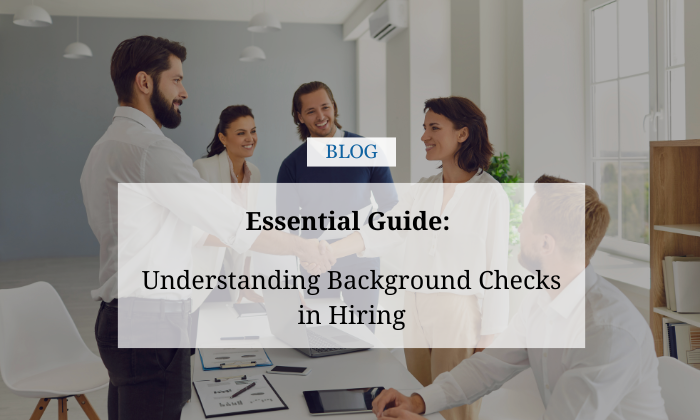Employers primarily conduct these checks to prioritize public safety, enhance the quality of their hires, and safeguard their company’s reputation. For a thriving and secure business environment, it’s crucial to prioritize both employee safety and the company’s image.
Take the initiative to familiarize yourself with the ten “red flags” to watch for during a background check on potential hires. Equipping yourself with this knowledge can help you proactively address any concerns that may arise.
Securecheck360
Here at Securecheck360, we’re experts in delivering top-notch Employment Background Screening Services, serving businesses of all sizes across the globe. Our customized solutions are finely tuned to meet the unique requirements of small, mid-sized, and large organizations. We’re dedicated to equipping companies with the vital tools and insights they need to make well-informed hiring choices. As one of the leading background verification companies, we’re committed to supporting even small businesses as trusted background check companies for small businesses to ensure they have the confidence to build the best teams for their success.
To know more about our services, book your free demo today!
Here are the key 10 red flags to watch out for:
1. Poor Credit History
Several employers consider a candidate’s credit history during the pre-hiring background check process. When assessing a potential employee’s credit, it’s essential to define which financial history aspects could raise concerns based on the specific role. For instance, a track record of unsettled debts might raise doubts about a candidate’s suitability for a financial management position.
It’s worth noting that some states have regulations regarding the use of credit information in specific hiring determinations. Nevertheless, in many states, conducting credit checks for managerial roles and positions involving handling company finances is permissible. Ensuring compliance with relevant state laws, federal anti-discrimination regulations, and the Fair Credit Reporting Act, a national law governing consumer information access, is crucial.
2. Criminal History
Employers often run checks on a candidate’s criminal history to uncover any past legal charges or convictions. According to the Sentencing Project, as many as one in three Americans have a criminal record, with communities of color facing a disproportionate impact within the justice system.
When considering an applicant’s criminal history, it’s crucial for employers to assess which past offenses are non-negotiable for the role being filled. For instance, a violent felony conviction could disqualify someone from a caregiver position or any role where the safety of others is paramount.
If you’re unsure about the factors to consider when examining an individual’s criminal background, it’s advisable to follow the guidelines provided by the U.S. Equal Employment Opportunity Commission (EEOC). These guidelines outline considerations such as the nature and severity of the offense, the time elapsed since the offense or sentence completion, and the specific requirements of the position.
Since some states impose restrictions on how criminal history can be used in hiring decisions, it’s essential to review all relevant employment laws. Additionally, we recommend exploring the EEOC website for more comprehensive information on criminal background checks and anti-discrimination laws.
3. Concerning Social Media Content
In this digital era, it’s common for employers to delve into an individual’s online presence, seeking insights into their interpersonal behavior, relationships, or substance use.
When utilizing a background check service, it’s vital to ensure compliance with the Federal Credit Reporting Act (FCRA), which holds reporting agencies responsible for the accuracy, fairness, and privacy of gathered personal information. Despite being established in 1970, the law remains relevant for data collected online, including information obtained from social media screenings.
Before conducting such searches, it’s essential to define the type of content that could impact an individual’s suitability for a particular role.
You may also like to read “Employers’ Guide to Cybersecurity Background Checks“
4. Driving Infractions
When considering a candidate for a driving-related position, it’s crucial to start by examining their motor vehicle records. Look for any history of traffic violations to guarantee that your company’s assets and reputation are in secure hands.
Various infractions, ranging from DUIs to hit-and-runs, can impact job eligibility. Set clear criteria beforehand about which infractions would disqualify a candidate. Never overlook a driving violation in someone’s history, as it could potentially endanger others’ lives in the future.
5. Sex Crime Convictions
Individuals with certain sex offender records are required to publicly disclose details such as their photo and address on multiple federal, state, and local databases.
Regarding employment, state laws governing the use of a candidate’s sex offender status can differ. For instance, in states like California, employers are prohibited from using a candidate’s sex offender status as the sole reason to reject them, except in cases where it’s necessary to protect an at-risk individual.
What should you do if a background check reveals that your candidate is listed on a sex offender registry? Firstly, consult a legal expert who can provide insights into how various sex crime laws apply to the applicant, your business, and the safety of others. Secondly, consider carrying out additional forms of background checks.
6. False or Stolen Social Security Number
Employers often check Social Security numbers (SSN) during background screenings to verify a candidate’s identity and uncover potential discrepancies. This process not only confirms the candidate’s identity but also reveals any use of aliases, past addresses, or inconsistencies in provided information.
If the search suggests the use of a false or stolen SSN, or if discrepancies in identity arise, it’s crucial to investigate further. Before making any decisions, communicate with the candidate to clarify any potential misunderstandings. Intentional deception could indicate underlying issues, so it’s essential to assess how such behavior reflects on their character and your company’s reputation.
7. Using an Alias
If an applicant uses a name different from their legal name, it could be a matter of preference or something more complex, like concealing a criminal past or diverting attention from official records linked to their real name.
Engage the candidate in a conversation about any other names they might use. Utilize a social security trace to uncover any potential aliases. Be sure to conduct thorough background checks on each name associated with the candidate to ensure comprehensive scrutiny.
8. Resume or Interview Misrepresentation
According to a study of 400 job applicants, 40% admitted to or planned to misrepresent themselves during the hiring process. This underscores the importance of reference checks in validating a candidate’s claimed skills, experience, and background.
If discrepancies surface, have an open discussion with the candidate. Regardless of the scale of the misrepresentation, it’s crucial to address any deliberate dishonesty seriously when deciding on the hire.
9. Education Falsifications
Around 40% of participants admitted they would substitute a prestigious university’s name for their actual alma mater on their resumes. To ensure transparency, opt for FCRA-compliant background checks that incorporate education verification. Should any inconsistencies arise, address them directly with the candidate.
Ultimately, it falls on you as the employer to determine if an ethical lapse, like misrepresenting educational credentials, should impact the candidate’s job offer.
10. Employment History
Almost half of the participants, 42%, misrepresented their reasons for leaving previous positions. Many asserted they left voluntarily when they were actually terminated.
Ensure you verify your candidate’s work history through an FCRA-compliant background check service that covers employment verification.
If an employee has misrepresented their employment history, provide them with an opportunity to clarify. However, if they are caught in a lie, consider this a significant warning sign.
Protect Your Company and Your Future
No employer wants to discover red flags in a seemingly excellent candidate’s background check. It’s essential to assess any inconsistencies in light of the candidate’s overall qualifications and capabilities.
When red flags arise, there’s no universal solution, but initiating an open discussion with the candidate during the hiring process is a good starting point.
Ultimately, as an employer, it’s your responsibility to safeguard your company, employees, and clients. Any red flags may indicate deliberate dishonesty or misrepresentation that could potentially jeopardize others, demanding serious consideration.







